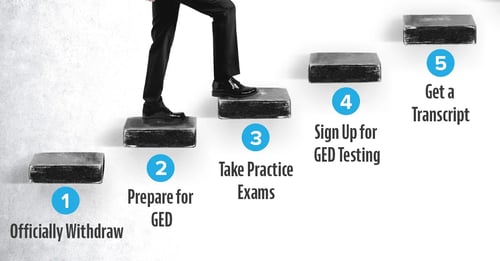8 min read
How to Drop Out From High School Successfully in 2026
By: Essential Education Team on February 16, 2026 at 9:30 AM

Deciding to drop out of high school is a big decision. Choosing this path will significantly impact your life now and in the future. There are many things to consider before officially withdrawing. This article will encourage you to think through your current circumstances, explore your options, and make the choice that’s right for you. We will provide valuable questions, answers, resources, and action steps to move forward personally and professionally. The journey of a high school dropout is not without its challenges. Success is possible. Keep reading to learn more about moving on after dropping out of high school.

Questions to Ask When Thinking About Dropping Out
Why are you dropping out?
Why are you thinking about withdrawing? Are there physical or financial challenges? Do you have pressing family responsibilities? Is your current school environment affecting your social or emotional health? Is an academic struggle or learning difficulty stalling your progress? Does a traditional school schedule limit your time to explore personal passions and interests? Are you bored? Do you feel bullied? If you answered yes to any of these questions, you are not alone. Thousands of students encounter these or similar struggles each school year. Getting to the heart of why you want to drop out is important. There are countless reasons why students consider withdrawing. Many face very real and valid obstacles to a traditional high school experience.
To gain clarity and confidence in your decision, you should stop and consider all of the possibilities. Is dropping out your only option? Have you explored additional resources? Have you talked to your parents, guardians, or a guidance counselor? Do you have a plan for how you might complete your high school education at a later date? You will be asked to detail your reason for withdrawing, so be fully prepared to communicate and explain your choice.
What are your future goals?
One thing that gives many students pause in dropping out of high school is they feel their future academic and career options will suffer. While the path may differ for those who do not earn a traditional diploma, high school dropouts can still enjoy higher education opportunities, professional success, and financial stability. They need an idea of where they want to go and the steps required to get there. For instance, do you want to pursue a college education, trade opportunities, or military service? All are possible without a traditional high school diploma. You just need to understand the alternative steps to reach these goals.
What will it take to move forward?
A recent article from Psychology Today encourages students to consider how they will gain dropout support in four key areas: career preparation, personal development, social development, and fun. Experts urge students to think through potential job impacts, pursue outside sources for individual growth, and consider how they will continue to enrich their lives with interpersonal connections and extracurricular activities. Support in each of these areas is crucial to making a solid transition out of high school.
Remember, dropping out is not a final act. Perhaps now is not the best time for you to continue your education. Maybe a conventional high school environment isn’t working for your current needs. Saying “not right now” to finishing high school is not the same as saying “never.” In fact, over 75% of high school dropouts finish their high school education at a later date. The majority of these students earn a high school equivalency diploma by taking a nationally recognized exam called the GED or HiSET. Over 18 million people in the United States have passed the GED and pursued careers in countless fields of interest. If they can do it, so can you!
How does it work?
The process of dropping out of high school depends on two key factors: student age and state of residence. Some states allow students to drop out as early as 16, while others require individuals to be at least 18. While several states allow students 18 or older to withdraw independently, many require students 16–18 years of age to have the expressed permission of a parent or guardian. Meanwhile, a few states forbid anyone under 18, regardless of parental consent, to legally drop out. You can learn more about education law in your state.
Each region has a different process, series of forms, rules, and regulations. It’s essential to understand and follow the correct steps. Whatever you do, do not simply stop going to school. While a prolonged absence technically makes you a dropout, avoiding the official withdrawal process can have serious consequences for students and parents.
When you stop going to school, you are considered truant. Truancy can result in significant monetary fines and community service for you and your guardians. Failure to follow the correct legal process for dropping out of high school can also limit your options in the future, including your ability to obtain a high school equivalency credential.

Let’s Review: How to Drop Out of High School
- Think carefully about why you want to drop out.
- Consider all of your options and alternatives.
- Consult parents and trusted advisors.
- Consider additional support and plan for life after dropping out.
- Check out the age requirements and legal processes to withdraw in your state.
- Follow all state rules and regulations to avoid negative consequences.
- Make a plan for how you might finish your high school education in the future.
- Learn more about obtaining a high school equivalency diploma.
You Dropped Out. What Now?
While your reasons for dropping out of high school may be justified, high school dropouts face significant challenges. After making the initial decision, many students ask questions like, Can you drop out of high school and get a good job? Can you drop out of high school and join the Army? Can you drop out of high school and make a decent salary?
The reality is that many careers require a high school education. Many colleges and vocational schools request proof of high school completion before beginning classes and training. Military recruits also need a high school certificate to progress through various service tiers. Studies also show that those with a high school education have higher earning potential than those without this achievement. So, how do high school dropouts go on to find success?
While some consider online schools, work-study opportunities, or community college bridge programs, many high school dropouts find earning a high school equivalency credential to be the quickest, most cost-effective way to move forward personally and professionally.
A high school equivalency diploma is received after a student studies for and passes a national certification exam. For many states, this exam is called the GED. Other states offer an exam called the HiSET. Some states offer students their choice of exam. Passing the GED or HiSET provides individuals with a high school equivalency credential. This achievement stands as proof of a high school education and opens doors to a world of educational and career opportunities. 98% of all colleges and employers accept GED credentials in the same way they would a traditional high school diploma.1 Barriers to higher education, vocational training, workforce development, and financial stability are significantly reduced upon receiving this achievement.
Obtaining a high school equivalency credential is a valuable alternative to a traditional high school diploma. Many well-known leaders and celebrities have received a GED certificate. These renowned professionals have gone on to make unique contributions and enjoy substantial earnings. Artists, musicians, activists, athletes, and entrepreneurs, including Ringo Starr, Michael J. Fox, Gene Hackman, Mary Lou Retton, Danika Patrick, Loretta Lynn, Pink, Jerry Garcia, 50 Cent, and Jay Z are just a few of the incredibly successful people who dropped out of high school and earned a high school equivalency credential.

From Dropping Out to Earning a GED
1. Officially Withdraw
Learn and follow all state and local guidelines to formally withdraw from high school. Be sure you understand and abide by age-related procedures and complete all the proper paperwork.
2. Prepare for GED
Preparing for the GED exam may be easier than you think. While you can attend classes in-person or online, many students enjoy the flexibility and freedom of virtual preparation courses, like GED Academy, the best-rated online GED classes. If you are under 18, be sure to take note of your state’s specific requirements regarding test prep.
3. Take Practice Exams
In addition to completing lessons and refreshing any subject matter covered in the exam, you’ll want to take regular, timed practice tests to check for true test readiness. These exams help you know what to expect and decide when to take the official GED or HiSET exam.
4. Sign Up for GED Testing
Registering for the GED is an easy process. Students create a free account at ged.com, the official site for all national GED testing. Here, students can schedule their exams, get official score reports, and order a copy of their diploma upon passing. Students can take the exam in person at a testing center or online through a virtual test proctor. These administrative formats vary by state and have unique requirements. Learn more about your state's official testing to better understand your options.
5. Get a Transcript
Most colleges will request your official GED transcript after passing the exam. This document is a detailed score report. It helps universities correctly place you in classes and ensure you are ready for academic success. A transcript also highlights areas of strength for potential employers. There are unlimited job opportunities after receiving a GED. A transcript is a great way to highlight your hard work and accomplishments when beginning a new career. All official transcripts are ordered through your personal account with the national testing service at ged.com.
Frequently Asked Questions
- Why do high schoolers usually drop out?
The reasons for dropping out of high school are as unique as the students themselves. Family circumstances, financial problems, learning difficulties, and social and emotional struggles are just a few of the many obstacles that can lead students to the difficult decision to withdraw. - Is it possible to drop out of high school and succeed?
Yes! Just because you didn’t finish high school in a traditional manner, doesn’t mean you lack the intellect and skills needed to succeed. Taking an alternate road to higher education and a career you love may not be easy, but it is possible. The most important thing is to keep going. There’s no such thing as the right time–just time and what you choose to do with it. - How many dropouts succeed in life?
Millions of students have earned a high school equivalency diploma through the GED much later in life and now enjoy all the rights, privileges and opportunities of a traditional high school graduate. Many experience the joy of having a job they love and the financial security to provide for themselves and their families.
1. “Evolving to Meet Students’ Needs,” GED Testing Service. Retrieved from: https://ged.com/about_us/ (Visited December 4, 2023).

